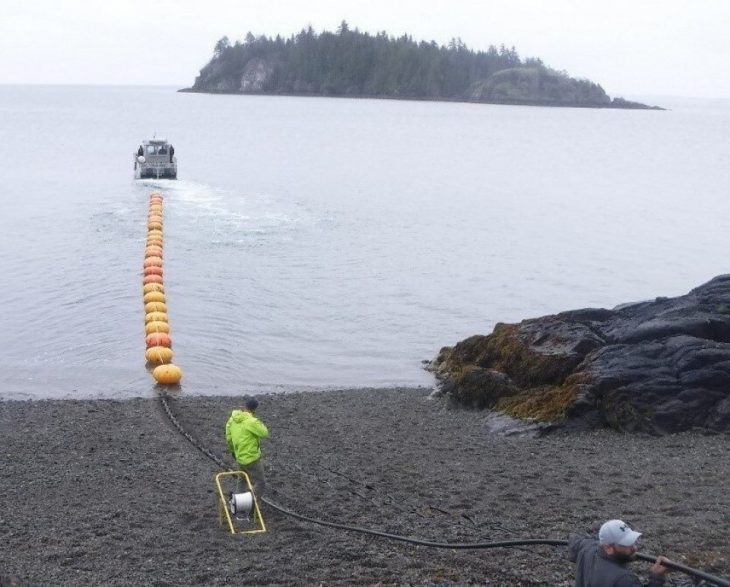
CityWest, meanwhile, seeks to be its own last-mile provider
By Ahmad Hathout
Shaw Communications wants to, in some capacity, get involved in British Columbia’s $45.4-million Connected Coast fibre project, according to a briefing note obtained by Cartt.ca.
The company has asked the project’s main proponents, Prince Rupert’s CityWest and the Strathcona Regional District, to “partner to accelerate the delivery of service and/or as a key wholesale customer,” according to the note, written ahead of a February 3, 2021 meeting between company officials and B.C.’s Ministry of Citizens’ Services, which manages broadband in the province.
CityWest and Strathcona had chosen Baylink Networks as the prime contractor for the fibre build by the time of the note’s publishing. The note said “Shaw hopes to resume conversations to explore partnership opportunities,” in light of Baylink winning the contract.
In fact, Shaw has been gunning for some type of involvement in the project since 2018, the note said.
Meanwhile, Shaw has been actively pursuing projects and builds in the province, in hopes of bolstering its competitiveness. It has a number of fibre transport projects, including one from Whistler to Cache Creek, one from Prince George to Dawson Creek, and another from Chetwynd to Fort St. John. Shaw also has a partnership with Rogers for a fibre transport run from the city of Hope through Merritt, Kamloops and Pinantan Lake.
A briefing note said Shaw is in active discussions with local communities and ISPs “about enabling last mile connectivity” through these projects.
But it is not just Shaw that has been engaged, though Cartt.ca only has the details on what Shaw’s potential involvement could be. In a strategy presentation jointly prepared by CityWest and Strathcona late last year, the proponents have said that they are “actively engaged with management of Telus, Rogers and Shaw regarding planning, interest and opportunities for collaboration.”
“In addition, [Connected Coast Partnership] has engaged with multiple small and independent ISP’s that could be positively affected by Connected Coast, exploring interests and opportunities for collaboration,” the presentation added, with no more detail.
Last Tuesday, CityWest announced the acquisition of internet service provider West Island Cable, adding the prospect of delivering services from the Connected Coast fibre directly to consumers to its broadband goals. That is because the yet-to-be-built fibre project is an exclusively backbone project, meaning the proponents will manage the line and will rely on other ISPs to deliver the last-mile to homes and businesses.
CityWest has for a long time expressed interest in using the project to deliver its own last-mile services, and Shaw’s desire to get involved appears to show an emerging competitive dynamic. Documents that Cartt has retrieved show that the provincial government has clarified that the proponents can apply for separate funding to be able to deliver those services, but that it is not part of the scope of the original project.
And now, more new information is emerging that shows CityWest’s ambitions: according to separate documents, also obtained by Cartt.ca, CityWest had submitted five applications for the provincial government’s $90-million recovery intake program, which it hoped to use to drive connectivity from the Connected Coast line to homes in 19 coastal communities, including in Bella Coola, Cores Island, Gold River, Sayward, and Quadra Island.
The company, however, was told to resubmit the applications to other funding programs for consideration, including the larger Connecting British Columbia program and the federal Universal Broadband Fund because the recovery program parameters require last-mile projects be completed by the end of October this year. (The Connected Coast project has been delayed two years to at least March 2023.)
In a briefing document to minister of Citizens’ Services Lisa Beare earlier this year, the ministry noted that there was a concern that a delay in last-mile project approval, which the coast project depends on for success, will “delay benefits” of the project to those 19 coastal communities. In fact, according to the document, “almost all” of those communities already have existing last-mile infrastructure.
The coast project, first announced in January 2018, consists of a stretch of fibre cable that is expected to snake in and out of the water along the province’s coast. Since its announcement, this publication has extensively documented issues related to the project, including pandemic delays, logistics, management changes, fibre ownership hurdles, and federal revisions that scaled back ambitions. But it is expected to begin construction later this year.
The project is being funded in part by the federal government’s $585-million Connect to Innovate program, Indigenous Services Canada, the province’s Northern Development Initiative Trust, and the First Nations Trust Company.
Photo borrowed from the Connected Coast website.


